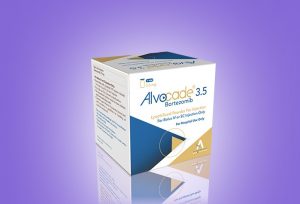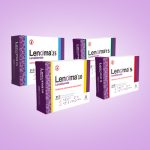ALVOCADE®

Bortezomib
Description
ALVOCADE® for Injection contains Bortezomib which is an antineoplastic agent. BORTEZOMIB is a modified dipeptidyl boronic acid.
Indication
Bortezomib is indicated for the treatment of patients with multiple myeloma.
Bortezomib is indicated for the treatment of patients with mantle cell lymphoma.
IMPORTANT SAFETY INFORMATION
Peripheral Neuropathy: BORTEZOMIB treatment causes a peripheral neuropathy that is predominantly sensory; however, cases of severe sensory and motor peripheral neuropathy have been reported. Patients with pre-existing symptoms (numbness, pain or a burning feeling in the feet or hands) and/or signs of peripheral neuropathy may experience worsening peripheral neuropathy (including ≥ Grade 3) during treatment with BORTEZOMIB. Patients should be monitored for symptoms of neuropathy, such as a burning sensation, hyperesthesia, hypoesthesia, paresthesia, discomfort, neuropathic pain or weakness. Patients experiencing new or worsening peripheral neuropathy during BORTEZOMIB therapy may require a decrease in the dose and/or a less dose-intense schedule.
Hypotension: The incidence of hypotension (postural, orthostatic, and hypotension NOS) was 8%. These events are observed throughout therapy. Caution should be used when treating patients with a history of syncope, patients receiving medications known to be associated with hypotension, and patients who are dehydrated. Management of orthostatic/postural hypotension may include adjustment of antihypertensive medications, hydration, and administration of mineralocorticoids and/or sympathomimetics.
Cardiac Toxicity: Acute development or exacerbation of congestive heart failure and new onset of decreased left ventricular ejection fraction have occurred during BORTEZOMIB therapy, including reports in patients with no risk factors for decreased left ventricular ejection fraction. Patients with risk PRES, discontinue BORTEZOMIB. The safety of reinitiating BORTEZOMIB therapy in patients previously experiencing PRES is not known.
Gastrointestinal Toxicity: BORTEZOMIB treatment can cause nausea, diarrhea, constipation, and vomiting sometimes requiring use of antiemetic and antidiarrheal medications. Ileus can occur. Fluid and electrolyte replacement should be administered to prevent dehydration. Interrupt BORTEZOMIB for severe symptoms.
Thrombocytopenia/Neutropenia: BORTEZOMIB is associated with thrombocytopenia and neutropenia that follow a cyclical pattern with nadirs occurring following the last dose of each cycle and typically recovering prior to initiation of the subsequent cycle. Monitor complete blood counts (CBC) frequently during treatment with BORTEZOMIB. Measure platelet counts prior to each dose of BORTEZOMIB. Adjust dose schedule for thrombocytopenia. Gastrointestinal and intracerebral hemorrhage has occurred during thrombocytopenia in association with BORTEZOMIB. Support with transfusions and supportive care, according to published guidelines.
Tumor Lysis Syndrome: Tumor lysis syndrome has been reported with BORTEZOMIB therapy. Patients at risk of tumor lysis syndrome are those with high tumor burden prior to treatment. Monitor patients closely and take appropriate precautions.
Hepatic Toxicity: Cases of acute liver failure have been reported in patients receiving multiple concomitant medications and with serious underlying medical conditions. Other reported hepatic reactions include hepatitis, increases in liver enzymes, and hyperbilirubinemia. Interrupt BORTEZOMIB therapy to assess reversibility. There is limited re-challenge information in these patients. 5.10. Embryo-fetal Risk: Women of reproductive potential should avoid becoming pregnant while being treated with BORTEZOMIB.
Advise females and males of reproductive potential that they must use contraception during treatment with BORTEZOMIB and for 2 months following treatment. If BORTEZOMIB is used during pregnancy or if the patient becomes pregnant during BORTEZOMIB treatment, the patient should be apprised of the potential risk to the fetus.



